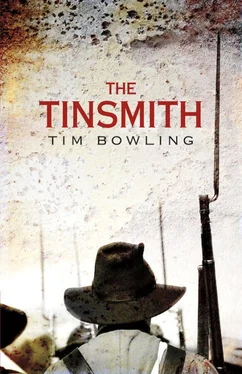But then, even the excitement of the salmon run and the slow, tortuous drama of the child hovering between life and death became secondary to the news of Dare’s return.
One morning, as Anson checked Louisa’s pulse for the thousandth time, trying again to decipher her mumbled, semi-conscious words, Henry Lansdowne appeared in the doorway.
“A letter’s come for you,” he said.
It wasn’t exactly a letter, just a few hastily penned sentences on the back of an invoice for pig tin. But Anson knew the hand well enough, and the directness of the tone.
Back at the Slough. Come as soon as able. The difficulties I mentioned are unchanged and I have need of your counsel.
Dare
At last! After all the days of tense waiting—during which the Lansdownes certainly seemed to think that their fierce competitor had not gone away at all—Anson found the note an immense relief. But it left him in the same quandary. He looked at the girl, then back at the note. In the fetid gloom of the house, he wondered if Louisa could be left in her family’s care for a short while.
The girl stirred. Her teeth chattered rapidly, as if trying to keep pace with her pulse. She moaned and put a hand to her head. Anson knew she was suffering much pain there as well as throughout her limbs. Typhoid cases generally passed through three distinct phases, of which this was still the first. But with the violent chills generally came the fingertip-sized red spots on the chest and abdomen.
Anson gently lowered the top of the girl’s shift. No spots yet, but he suspected they would appear soon. In the meantime, there was little to do but to keep the linens clean and the air circulating through the room and to hope. Doses of quinine, broths for combating the fever, a light diet easy on the bowels and stomach (chicken broth, mostly): he went through all the required treatments but knew that, when the crisis came, it would be the child’s own will that determined the result. Anson could hardly believe, despite the slackness of the girl’s mouth and her pewter-dull eyes, that she might choose death over life. But his belief in a patient’s will to live had been severely tested before and had failed. So he tried not to make any predictions, even to himself.
He left the sick room, determined to head for Crescent Slough right away, determined to feel no guilt for leaving the child in the loving care of her relatives. After all, he had another loyalty to attend to, older and more powerful. And he knew he could trust the mother and aunt to follow his instructions for the child’s care in his absence.
Stepping into the light almost hurt; the clarity was such that he had to hold his hand over his eyes for a moment as he walked along the riverbank, idly following the sounds of work: the whining of conveyor belts and the clunking of cans from inside the cannery, and the sporadic shouted orders of men on the wharves outside.
As always, Anson found the slaughter both repellent and oddly attractive. There were so many salmon that whole fish were routinely thrown dead into the water if they’d been left in the sun too long. Of those that were processed, often only the midsections were used to fill the cans; the rest of the fish was simply dropped on the cannery floor to join the great red pulpy mess through which the smock-clad Native women and Chinese men trod heavily from task to task. It was little wonder to Anson that the settlement had known many outbreaks of typhoid fever; with so much fouling of the drinking water, along with the infectious rottening of the air, how could it be otherwise? According to Mary Lansdowne, there had been ten cases the summer before, with four fatalities, including Thomas and Edney’s eldest child. With so many guts sloshing back and forth on the tide, the atmosphere was decidedly poisonous. If he had not been so harried by recent events, Anson would have stressed more emphatically to the Lansdownes the need for improved sanitary conditions. But the English brothers themselves were too preoccupied to pay much heed to his advice on those occasions when he tried to raise the subject.
As he reached the wharf, Anson saw a thin, bare-chested young man standing in the middle of a scow loaded with still, apparently dead salmon. The stench of blood and slime was heavy and overwhelmed the usual muddy musk of the river. The man held a long wooden stick in his hand. At the end of the stick was a large curved hook. With much difficulty, the man was trying to hook the fish and flip them onto the wharf where the figure of Thomas Lansdowne, hands on hips, glowered down at him.
“For Christ’s sakes, man,” he shouted. “That’s no way to pitch fish! Give me that pick!”
Several other men standing nearby grinned. One yelled, “Atta boy, Tom, you show him!”
Anson watched in amazement as Thomas Lansdowne threw himself off the wharf and onto the sloppy pile in the scow. Immediately he found his footing, yanked the pick away from his slack-jawed worker, and set about pitching fish. The result was impressive, at first. Anson couldn’t even see the pick as the Englishman wielded it, the hook barely puncturing the head of each salmon, a steady stream of the silver fish leaping as if brought back from the dead and landing with a slosh on the mounting pile on the wharf.
The young man’s jaw dropped farther. The men watching cheered and clapped; a few others emerged from nearby buildings to take in the scene. The fish continued to fly through the air. Twenty, thirty, forty, fifty.
My God, Anson thought, enough. A strange silence descended. Only the slapping of each dead fish on the pile and a quick, harsh grunt from the thrower—who now sprayed sweat from his head, which swung like a mallet—sounded along the river. Even the cannery had fallen quiet, as if sensing its own workings to be inadequate. And still the fish rose and slapped down, rose and slapped down. The spectators looked apprehensively at one another. The young worker tentatively reached to take the pick back, and he must have said something, for Thomas Lansdowne whirled and cursed, the action only the briefest pause in the fierce rhythm of the pitching.
Eighty, ninety. At last the speed slowed. A couple of fish hit the side of the wharf and splashed into the river. Thomas Lansdowne’s face blazed like the sun, which hung high above him and was gradually sapping his strength. But the man did not stop. The fish must have seemed as heavy as bars of lead to him now. He laboured up from the bent position, the veins swollen in his neck, and heaved each time as if forcing something through a stream of molasses. And as his energy weakened, his grunts turned to cries. Now more fish splashed in the river than hit the wharf. He fell, got up again. The pick waved like a divining rod. The young worker had backed away as far as possible without jumping overboard.
One of the spectators said quietly, “All right, Tom. You showed him.”
The great head lifted, dripping with sweat. The white shirt was drenched, as if he’d just been swimming. His chest moved like a bellows. He squinted into the sun, then lowered his eyes and, very slowly, levelled them at each man on the wharf. Finally, the eyes came to rest on Anson.
As the two men were thirty yards apart, Anson could not be certain of the expression on Thomas Lansdowne’s face, but he detected a general air of blankness, as if the man had not come fully out of the dream of his own physical strength. Gradually, the blankness lifted, replaced with a deeper worry than usual. He raised a finger, which Anson interpreted as a sign for him to wait. Then the Englishman scrambled over the fish, stood on the scow’ s edge, and, reaching up, hoisted himself onto the wharf.
“Doctor! She hasn’t… she isn’t…” He struggled to catch his breath as he walked. A trail of bloody boot prints stained the sun-baked wood.
Читать дальше












